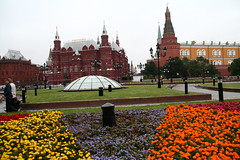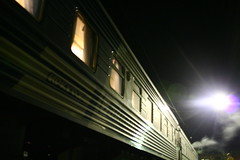It's our last night in China. Tomorrow, we're attempting to cross a border that's 12,000 feet above sea level—where a couple of inches of snow are expected—and that opens at noon for the first time in ten days. And all we've got is a car to the Chinese side of the border. Wish us luck...
But, what am I saying? We're not really in China any more. We haven't been for the last week. We're in this bizarre other world.
The Xinjiang province (the word in Chinese means "new frontier") has always been a crux of the Silk Road. Trade through here has been going on for at least seven millenia. It's been the seat of multiple rebellions over its long history, was briefly united with parts east under the Mongol reign in the thirteenth century, and then with parts west after Timur's occupation in the fourteenth. For the next five hundred years, it was ping-ponged between eastern and western rule, until it became a separate country (called "Turkestan") under Yaqub Beg in the nineteenth century. That lasted only a few years, before the Manchu swarmed in from the east and wrested control. It was again independent (and only part of it) as Eastern Turkestan in 1945, but then, again, only briefly. In 1949, after the establishment of the People's Republic of China, there rose up another separatist movement that refused Beijing's rule. This Muslim league's leaders, however, all suspiciously died in a plane crash; Eastern Turkestan was overrun and its leader executed in 1951.
The Uighurs, who people this province (though that's not completely true any more), are not Chinese. Their language is nothing like Chinese; it's not even in the same linguistic family, and it's represented by letters derived from the Arabic alphabet (though it's not in the Semitic language family either; the letters are just used phonetically). People greet each other with the ever-so-Muslim salaam aleykum, and, even if they've never been truly independent, they are fiercely so. There's palpable tension between the Uighurs and the Han Chinese, whom Beijing has been enticing to move west since 2000 (through its ingeniously-named "Develop the West" campaign). Restaurants are either frequented by Uighurs or by Chinese, but not by both. Each group views the other with suspicion and speaks the other's language only begrudgingly (and accentedly at that). It's no longer, as the Lonely Planet writes, about whether you dip your dumplings in soy sauce or in vinegar, but about how you like your mutton cooked.
The fierce independence even extends to time: Although all of China operates officially on Beijing time, the sun, unfortunately, does not seem willing to follow Beijing's whims. So, Xinjiang has its own, unofficial, Xinjiang time, two hours behind Beijing time. This makes for interesting discussions when booking tickets.
In short, this is a fascinating part of China to visit.
Urumqi
The capital of Xinjiang is the most Han-populated city in the province, and the only one in which there is some measure of peaceable interaction. The benefit, of course, is that there's a Carrefour and enough ramen to get us on to our next country. Stay along Urumqi's main streets, and you'll see skyscrapers, hot pot restaurants, and grocery stores. But turn off into any of the side streets and you enter a fascinating world that hasn't changed, it seems, in years—a world of outdoor markets, of men in traditional Kazakh hats bargaining over half a sheep, of mutton kebabs, of mosques on every corner, of burqas, bread cooked in open ovens, and houses in disrepair. And of people who didn't quite know what to do with us—an Arab and a Taiwanese in Muslim territory. It was a bit jarring.
Urumqi is also home to the Xinjiang Uighur Autonomous Region Museum. The museum has undergone a $13 million facelift that even includes Chinglish signs (yippee!), and is, quite honestly, one of the better museums we've seen this trip. Of its four exhibits, three are about the Xinjiang region—one on its history (and how wonderfully things have changed since the Chinese exerted their domination on the province; evidently the Silk Road couldn't have existed without the Chinese influence—ignoring the fact that, in the thirteenth century, when Marco Polo travelled the Silk Road, the influence was actually Mongolian. But, who am I to argue?), one on the different ethnic groups that call this province home, and one on the mummies found in the Taklamakan desert (more on the desert later). These are absolutely fascinating—they're mummies not through any preparation of the families that buried them. They're simply dessicated. They never rotted because they were just too dry.
And the desert's preservation is mind-boggling. You can see the mummies' fingerprints, their nail polish, their facepaint. They look like living—if slightly stiff and malnourished—human beings. According to one of the docents, one mummy—the Loulan Beauty—is, at 8000 years old, the oldest mummy in existence.
Of all the cities we've visited in China, we might have liked Urumqi the best.
Urumqi to Kashgar
The train to Kashgar defies description. It's, quite literally, an assault on every sense. For twenty-eight hours. We were in the last two beds of the last car on the train, cheek by jowl with eighty-two other people. Silence is impossible, especially when the berths are open and there's quite simply not enough room for the people and their luggage. The corridor is packed. And our location also meant we were also right next to the bathroom.
God, how do you describe it? The smells—the fetid, orange smell of unwashed feet, the milky one of dirty babies, the grey, watery smell of squat toilets, the odors of raw sausage (eaten, straight out of the wrapper, with relish), peppers, cigarette smoke, sweat, musty old ladies, and decades-old carpet, all compete for primacy. And the sounds—I simply can't get over how dramatic most of the people here feel they need to be with their bodily functions. There's a veritable sonata of snot that happens constantly, with each movement more grand than the last. And I'm not just using that as cheap alliteration: there's actually an A-B-A'-coda structure to this expulsion of humors. Snort-snort-spit / Cough-hack-retch-cough-retch-spit / Snort-spit-snort-spit. One man's coda was a nice, long, relished bit of flatulence. Another guy's sonata took a full, timed six minutes. And it's not just the men who do this. The women do it too, though less often and slightly more quietly. The six-minute guy...he was back for more, half an hour later.
The terrain that the train crosses, though, is amazing. It passes the lowest and hottest point in China (Turpan, second only to the Dead Sea in depth below sea level; the highest temperature measured here was nearly 50 degrees Celsius) and, not three hours later, is up above 10,000 feet, crossing the Tian Shan mountains. It spends its entire length skirting the Taklamakan desert.
For good reason. "Taklamakan" means "He who enters never comes out." And I believe it. Supposedly it's the world's second-largest desert (though I've also heard fifteenth-largest...), and, unlike the Gobi, with its brush and vegetation and inexplicable saxault trees, this desert has nothing. Simply nothing. It's valleys of dirt between mountains of dirt around dried out river beds of dirt; sometimes the dirt is ochre or yellow or red or green, but mostly, it's just brown. The path around the desert was only discovered in the last couple of millenia. It's that massive. Our train was stuck for five hours in the middle of the desert, too, for high winds and rain (yes, rain...we've been so plagued by rain this trip that it even rained in the desert for us). But finally, twenty-eight hours later, after a range of Reeses-colored mountains and an incongruous oasis of grapes, corn, donkey carts, and poplar trees, Kashgar appears.
Kashgar
More Muslim than Chinese, more Central Asian than East, Kashgar has what's supposed to be the oldest and biggest open-air market in existence. Its location—at one of the major crossroads of the Silk Road, near Pakistan, Kyrgyzstan, Tajikistan, and India—means that people come from all over to trade here. We saw Kazakhs, Russians, Uighurs, Kyrgyz, Chinese, and the ubiqitous Western tourist. You can buy anything here. Cows, camels, kitsch, TVs, DVDs, cloth, carpets, cooked food, raw food, goats. You name it, it's on sale. Whereas, because of the Develop the West campaign, Xinjiang's Uighur population has dropped from 90% to 50% overall, here, it's still up near eighty. This place is not China.
Of course, it never rains in Kashgar. It rained for the market. Anyone else not surprised? At least we got a beautifully sunny day for Lake Karakul.
But here, more than anywhere we've been so far, I wonder—what's it like to be a minority in hegemony? All of us in the west who aren't of WASP origin think we're living in some sort of hegemony, but truthfully, we're not. Not this kind of hegemony. Not codified, government-sponsored hegemony. The biggest and boldest signs, even here in Kashgar, have no Uighur script on them. They're all in Chinese. The mosques, as Peggy has already mentioned, have placards in three languages detailing the Party's glorious contributions to the preservation of minority cultures (and, jarringly, religious freedom). Even the place we're staying—the Chinibagh Hotel, a word that isn't Chinese at all—has no Uighur writing anywhere except at its entrance.
What does that feel like? What does it feel like, as a minority person, to walk into the Xinjiang Uighur Autonomous Region Museum (I just like typing its full name) and see your culture's musical instruments, traditional costume, and home furnishings displayed on mannequins, with signs next to them blathering on about how "Kazakh women like the dance," or "the Uighur man embodies the plains"? Are you proud? Proud that your culture has been well preserved, in a well-done museum, for the world to see and learn? Or does it bother you that there isn't a section for the traditional music, dress, and home furnishings of the Han Chinese, that there isn't a placard reading, "Han Chinese women used to bind their feet"?
What's it like to see a huge statue of Mao Zedong in the central square of Kashgar? How does it feel that one of the only four exhibits in a museum dedicated to your culture is actually about revolutionary Han Chinese achievements (this one, interestingly, had no English signs)? What does it feel like to realize that your image, as a minority, is on the 10-cent and 50-cent pieces and on nothing else? Do you even realize this, having grown up under this regime? Or is this, really, just the way things are? I can't tell.
Does the propaganda, the ethnic displacement, the language supremacy bother you, or are you happy that money is, truly, being poured into your region? Is this what the First Nations people of North America felt when the Europeans first started settling?
Even though I find myself getting angry when I see blatant examples of an imposition of a foreign culture on a region steeped in its own history, I recognize I'm bringing my own anti-imperial western leanings to the table. But, really, what's it like to be a minority in hegemony?










